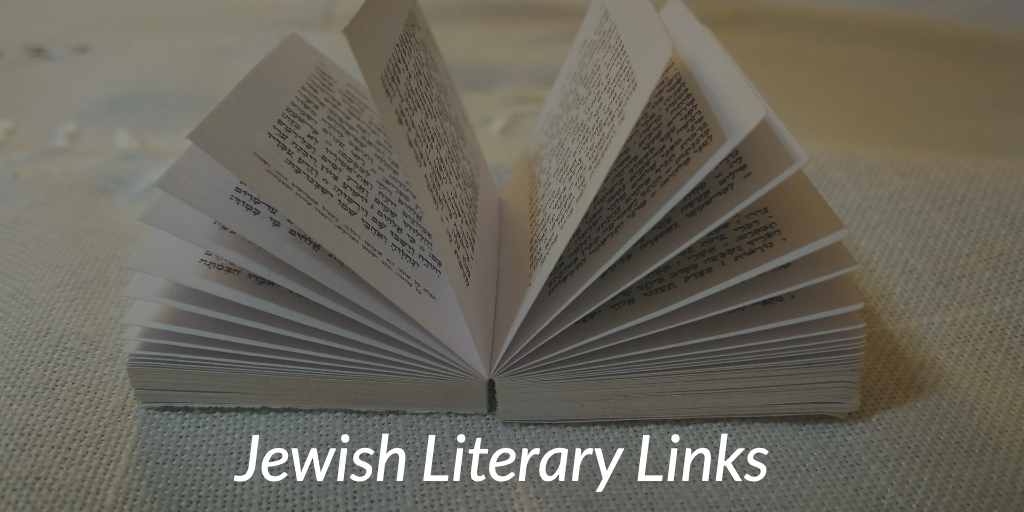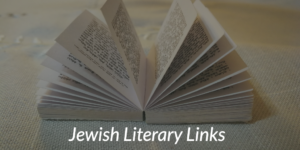Jewish Literary Links

Something a tad different this week.
Later today, the September issue of The Practicing Writer 2.0, my monthly newsletter for writers, will be going out to subscribers. This month’s issue includes multiple competitions and calls that seek explicitly Jewish work.
I thought that I’d offer My Machberet readers a preview.
In chronological order (most imminent deadline first):
- The application deadline for Hadassah-Brandeis Institute Research Awards is September 13. These grants “support research or artistic projects in Jewish women’s and gender studies across a range of disciplines.” Note that “creative arts proposals” must “deal with gender; projects by and about Jewish artists that do not deal with gender, do not meet the criteria.” Awards are “open to applicants regardless of gender or religion” and “applications (in English) from outside the United States are welcome.” Awards “junior grants” up to $2,000 and “senior grants,” up to $5,000, for “established scholars and professionals.”
- The London Centre for the Study of Antisemitism (LCSCA) Book Prize confers £1,000 “for the best book on, or relating significantly to, contemporary antisemitism.” Entries must have been published “between 25 September 2022 and 15 September 2023.” The competition is open “both to single authored monographs and also to multi-authored edited books. The prize will be awarded to the editors in the latter case….The Prize competition is open to authors of all nationalities, provided that their book is written or made generally available in English.” Deadline: September 19.
- From Sources: A Journal of Jewish Ideas: “The Spring 2024 issue will focus on communal Jewish life on college and university campuses in the US, Canada, Israel, and elsewhere. We invite proposals for long form essays (3500-5000 words) related to this topic, with a particular interest in work that combines analysis of current situations with a vision of how campus Jewish communities might thrive in the future.” Deadline: “Proposals will be reviewed on a rolling basis through September 30, 2023. After acceptance, essays will be due by December 31, 2023.” Payment: The call mentions honoraria for published essays; via email, I’ve been told that “the honorarium is $1000.” Editor Claire Sufrin has also told me that she’s particularly interested in hearing from writers who spend time on college campuses themselves, or at least have recently been involved in campus life in some way.
- Administered by the Association of Jewish Libraries, the Sydney Taylor Manuscript Award is a $1,000 prize that “recognizes unpublished manuscripts of Jewish fiction targeting ages 8-13…to encourage aspiring authors of Jewish children’s books.” For this award’s purposes, an “unpublished author” is defined “as not having previously published any works of fiction for young readers. This includes self-published as well as commercially published work. The manuscript must be a work of fiction in English with universal appeal of Jewish content for readers aged 8-13 years, both Jewish and non-Jewish. It should reveal positive aspects of Jewish life. Short stories are not acceptable.” NB: “While AJL cannot guarantee publication, the prize money has been an incentive for writers with varying experience to try their hands at writing for this genre. The award carries prestige in the publishing world and several Sydney Taylor Manuscript Award winners have subsequently been published.” Deadline: September 30.
- The current deadline for the Natan Notable Books Award is October 2 (for non-fiction titles published for the first time between April 1, 2023 and March 31, 2024). This twice-yearly award for nonfiction books on Jewish themes “highlights vital books and authors, and brings innovative and important ideas to the attention of diverse audiences. Around Passover and the Jewish High Holidays, Natan selects a ’Natan Notable Book,’ a recently-published or about-to-be published non-fiction title that will catalyze conversations aligned with the themes of Natan’s grantmaking: reinventing Jewish life and community for the twenty-first century, shifting notions of individual and collective Jewish identity, the history and future of Israel, and the evolving relationship between Israel and world Jewry. Natan Notable Book winners receive a Natan Notable Book seal and $5,000 for the author, marketing/distribution coaching and promotion from Jewish Book Council and Natan, and customized support designed to bring the book and/or the author to new audiences.”
Remember that “Jewish” writing can often find homes with/recognition from not-explicitly-“Jewish” venues. So be sure to check the newsletter for 80+ additional current opportunities for you/your work. (If you’re not (yet) a subscriber, all issues are archived on Substack; the September issue will be there soon!)
Shabbat shalom.

Thanks, Erika, for mentioning the Sydney Taylor Manuscript Award Competition.
We have a superb line-up of judges who are waiting to read manuscripts.
Because of the Jewish calendar this year, the deadline has been extended to October 5.
Aileen, it’s good to have that information publicized. Can it be added to the guidelines at https://jewishlibraries.org/sydney-taylor-manuscript-award/? At the moment, that page lists the current deadline as September 30.
It occurs to me that I should also have noted that you can find a more expansive list of awards and prizes for Jewish writing over on this website page. (It’s probably time for me to [re]check links and make some updates, but I offer the resource for whatever value it may still hold!) https://www.erikadreifus.com/resources/jewish-writing/awards-prizes/